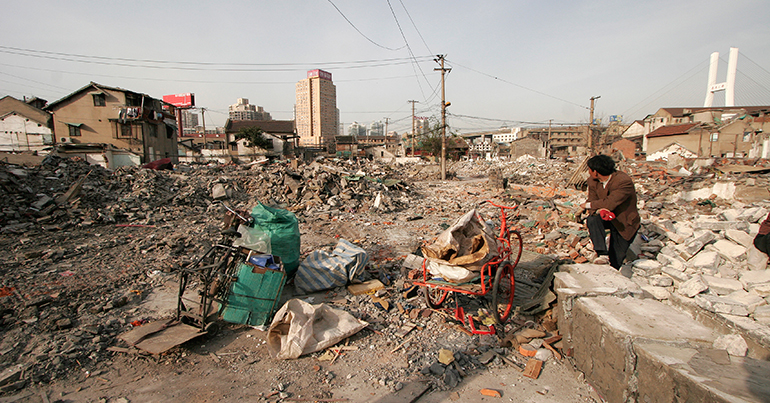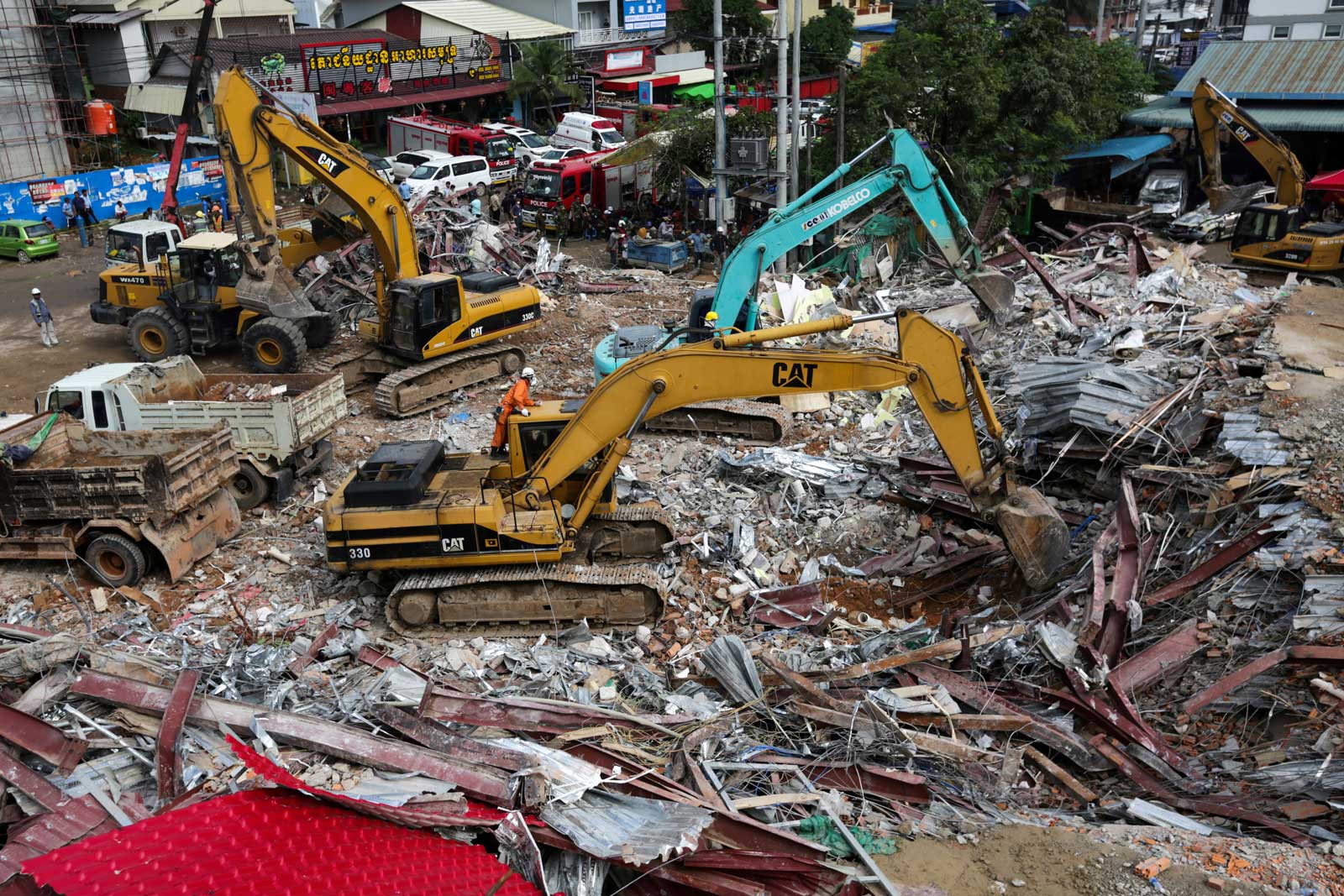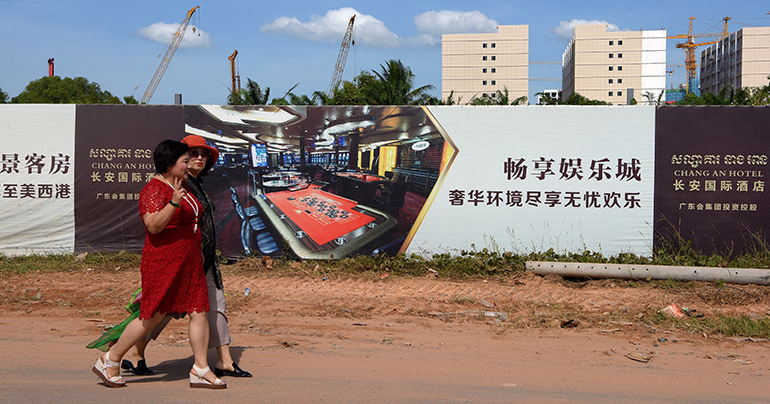This article is the first part in our two-day dive into Sihanoukville’s rampant development. You can read the second part here.
The minibus packed with Russian tourists belches clouds of black smoke as it bounces along the bumpy pothole-riddled roads of Sihanoukville.
The visitors, who are making their way to the ferry that will take them to Koh Rong Samloem, one of the two nearby islands that cater to Western tourists, remain quiet as they pass mountains of rubbish and construction debris.
With families living amidst the refuse, it is almost a parallel world to the hundreds of gleaming Chinese-owned casinos that dot the landscape. In many ways, Sihanoukville, once the seaside jewel of Cambodia, resembles a war zone. The buildings are all hollow shells and debris is everywhere.
What this latest busload of visitors have entered is a giant construction zone with no end in sight and no real rhyme or reason for the building. Dan Davies, director of property management at international real estate firm CBRE in Phnom Penh, said that much of the development was being done by Chinese speculators just looking to sell the land on to the next investor.
“Who is going to live in these buildings?” he asks.
“When we heard that all the bars were being torn down it was so sad to think that all of our Khmer friends were literally told to pack up and leave”
James Rainer, British bartender
It was just a few years ago that Sihanoukville was hailed as a paradise for Western backpackers, boasting dozens of beachside bars and youth hostels. One restaurant next to the pier remains – Yasmine Cafe – alongside a smattering of other restaurants nearby. But most of the old Western places are gone today, replaced by the casinos.
Although it is illegal for Cambodians to gamble, Chinese visitors to the Kingdom suffer no such restrictions – Sihanoukville draws thousands of gambling tourists each month from mainland China. Based on flight data, it is estimated that one million airline Chinese passengers will fly into Sihanoukville this year. To put that in perspective, four years ago the airport had fewer than 100,000 passengers and virtually no international services, according to Brendan Sobie at the Centre for Aviation, an industry intelligence company.


“I was in Sihanoukville from October 2012 to March 2013,” says James Rainer, a one-time bartender in the town. “Back then it was a bustling town that travellers flocked to for the beach and nightlife.”
“The Chinese bought the land and the government forced all the bars to close. They were literally bulldozed to the ground,” adds Rainer, who is from the UK.
“Serendipity Beach had bars and restaurants all the way down it. In the day time, locals and travellers relaxed on the beach. At night, the bars were lively with music playing until the early hours,” Rainer says.
Today the beach is instead lined with garbage. Sewage is pumped straight into the lagoon.
Such is the conundrum facing Sihanoukville. So much development has already happened – or is happening – that it will be almost impossible to reverse. Some of that construction is illegal – Provincial Department of Land Management director Cheng Srong told the Phnom Penh Post that there have been more than 100 cases where projects have been suspended.
Add in that the city does not have the infrastructure to support the hundreds of buildings that are going up and the result is streets flowing with human waste that people, mostly Chinese, wade through on their way to the casinos.
The government has vowed to crack down on crime and illegal construction, but so far not much has changed. On top of that, an online gambling ban announced in August that will come into effect at the beginning of next year has resulted in thousands of Chinese leaving, raising speculation that they might just abandon the city, leaving it with hundreds of empty buildings.
“I and others who worked there have nothing but fond memories of that town,” Rainer says. “When we heard that all the bars were being torn down it was so sad to think that all of our Khmer friends were literally told to pack up and leave.”
Dan Virak Holly, who, along with his family, owned the now-closed beachside Dolphin Shack bar, adds that Sihanoukville might be too far gone to fix.
“What can we do now?”
Wake-up call

The Sihanoukville situation is something that has been talked about for a while, but it has been largely ignored by the Cambodian government. That is, until June, when a seven-storey building collapsed, killing 28 workers who were sleeping inside.
It was a wake-up call that prompted the government to take action. The provincial governor was forced to resign – although he soon had a new job as an advisor to the government – and the government announced it would crack down on illegal buildings. Construction halted at dozens of sites.
A new governor, Kuoch Chamroeun, was appointed in June and tasked with cleaning up the situation.
Speaking at Chamroeun’s appointment ceremony on June 29, Minister of Interior Sar Kheng said the province needed urgent solutions to deal with its many challenges, including unregulated building work, crime, infrastructure development and pollution caused by rapid population growth.
Whether those words will translate to real action is anyone’s guess. Today, a rickety building – rumoured to be unregulated – standing just off the central roundabout looks on the brink of collapse and has been sealed off.
People living next door seem oblivious to the danger.
German Alex Felix is a former dive instructor and the owner of Granny’s Kitchen, a yogurt shop.
“That building made news because of the huge cracks in the walls,” Felix says. “It is still standing.”
“After the collapse, 14 buildings were deemed unsafe and the owners were ordered to demolish them,” he adds. “Another 70 buildings were ordered to be re-examined, but all of them including the 14 unsafe high-rises are still standing and occupied. There hasn’t been a single word from the local government.”
Will they stay or will they go?
Although tens of thousands of Chinese have left Sihanoukville since the government announced its ban on online gambling in August, more are still arriving.
The exodus of Chinese is expected to impact the economy in the short term, but many locals welcome it. “The Chinese are leaving,” says Dan, who hopes to return someday and start a new business.
If the Chinese leave, no one is really sure what that will mean for the hundreds of buildings still under construction – though the prospect of a city of abandoned homes is a grim one.
CBRE’s Davies says there is concern that Chinese money could dry up and that will hit the local economy hard. “There will be a lot of empty buildings,” he says.

Zoe Ng, director of Raintree Development Co. Ltd., a boutique office development for fast-growing companies, says the financial fallout is not what worries her.
She is concerned about inadequate infrastructure, which leads to sewage issues, as well as the possibility of having lots of empty buildings, which she sees as possible breeding grounds for crime.
“Many buildings lack water and electricity due to poor planning,” she says.
”Unfortunately nobody cares,” says Felix. “Nobody is accountable and in a year or so ‘Sinville’ will be pretty much a ghost town. Good thing. Many banks and greedy investors who gave loans on totally overpriced and now almost worthless land will go bankrupt too.”
Taken by surprise
The Chinese invasion of Sihanoukville three years ago took locals by surprise, forcing many to leave the city. Today, more than 90% of businesses in the city are Chinese.
“It hit like a cyclone,” Dan says. His family had been building their business since 2004 and had built it up to 30 employees. “We became popular and started hiring Westerners,” he says.
“It was a beautiful town with trees and mountains and beaches. Traffic wasn’t busy and it was so clean. I couldn’t see myself living anywhere else.” He now lives in Phnom Penh.
Back then people moved to Sihanoukville to enjoy the simple life. In 2016 and 2017, though, business slowed down. Dan says by his guess 35% of Westerners used to go to the islands before the Chinese influx, with many staying in town – but that more than doubled to 80% as the city changed.
Sihanoukville is not the only corner of Cambodia to have seen fluctuating tourist numbers. Tourism has been on the decline in Cambodia’s number one destination, Siem Reap, whose majestic temple complex of Angkor Wat was once hailed as one of the world’s unmissable wonders. With fewer and fewer Westerners taking to the coast and mainlander tourists often pouring their money into Chinese-owned hotels and tour companies, the so-called Kingdom of Wonder may soon see one of the main pillars of its economy on shaky footing.
Chhay Sivlin, president of the Cambodia Association of Travel Agents, said the impact on local businesses had been unmistakeable.
“As far as I’m concerned, it is true that the local businesses have been negatively affected by the China presence in Sihanoukville,” she said. “Based on observation, Chinese prefer to do businesses or receive services from their own people namely hotel or restaurants. Due to this reason combined with the drop of Western tourists, local businesses in Sihanoukville have been facing setbacks in earning profits.”
“I don’t feel safe there now. To go out now is impossible. You could open a business, but if you tried to do a beach bar they will send people”
Dan Virak Holly, former bar owner
“We didn’t know the Chinese thing was happening,” Dan says. “We couldn’t really see them and slowly they started bringing more people.”
He says it was in 2016 that they just started buying everything and life was getting more difficult. Western tourism dropped off. Property prices kept going up.
“We were told to leave the beach and the new owners gave us two months’ notice. We had spent all this money and we got no compensation,” Dan says. “They wanted everyone moved out.”

“2018 was like a bomb went off,” Dan adds, saying that the rubbish began piling up everywhere after the waste disposal company decided to no longer collect it. Today, much of it is burned or thrown into the water. “It was just piles of rubbish and sewage flooded people’s homes.”
The city floods because the irrigation canals are blocked, sending sewage flowing down the street when it rains. The wastewater has nowhere to go except into the sea.
“They just keep building things and the rubbish blocks it. I feel so sorry for the kids. They run around in sewage,” Dan says. “There was never a traffic jam in Sihanoukville and now you can’t move.” The government recently announced that it will spend $200 million to improve the roads.
The roads and traffic, however, are not the worst of it, Dan says, describing the city is just plain dangerous for Cambodians.
“They will just shoot you,” he says of the Chinese, showing a video from KPS Breaking News, a Khmer-language online news channel in Sihanoukville, of around a dozen Chinese attacking two Cambodians.
According to Cambodia’s Ministry of Interior, in the first quarter of 2019, 341 foreigners were detained across the Kingdom – 241 of whom were Chinese. The ministry has described the Chinese as the most criminally active group of foreigners in Cambodia.
Sihanoukville has witnessed several high-profile crimes of late including robberies, extortion and murders.

On October 6, police arrested three people for allegedly shooting a man to death in Sihanoukville, while another was placed in pre-trial detention by the Preah Sihanouk Provincial Court for an unrelated murder of a Chinese man.
In a separate case, a 29-year-old man was sent sent to court for allegedly killing a man and dismembering the body into three pieces on September 30, the Phnom Penh Post reported.
Former Sihanoukville governor Yun Min complained that the crime rate in the province was increasing.
According to the now-disgraced governor, part of the reason was due to the influx of “Chinese mafia who disguise themselves to commit various crimes and kidnap Chinese investors … causing insecurity in the province”, the ASEAN Post reported this year.
“They are unpredictable,” says Dan. “I don’t feel safe there now. To go out now is impossible. You could open a business, but if you tried to do a beach bar they will send people. There is not much freedom for us anymore.”
Still, he plans to return and open a hostel on Koh Rong Samloem.
He feels, however, that a part of his life has been stolen.
“It was a nice, relaxing, and beautiful city and now it is the opposite,” he says. “The Chinese took it all over.”

Winners and losers
Felix from Granny’s Kitchen says the Western tourists are gone and will not come back. “The ocean and nature are destroyed,” says the dive instructor.
He says Sihanoukville was a nice place with clean ocean, lots of fish, corals, nice beaches, little traffic and a bit of nightlife to keep things interesting.
“It was not a bad place to live if you love swimming, snorkelling and diving,” he says. “That all changed two years ago. Now sewage is dumped into the ocean and there is no coral.”
“The only people who have so far profited from this mayhem are some landlords, the police and local government [officials] who now drive Rolls Royce and Maybach,” Felix adds. “The rest of the people have lost.”


